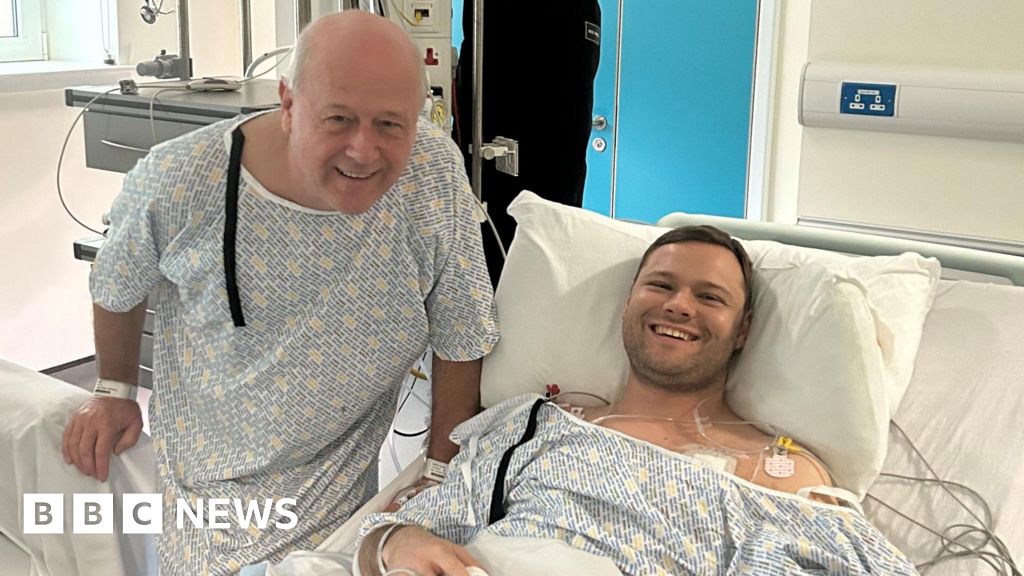ARTICLE AD BOX
 Image source, Getty Images
Image source, Getty Images
"Dangerous" muscle-building drugs are being sold illegally in shops around the UK, a BBC investigation has found.
The substances, known as Sarms, can cause erectile dysfunction, mood swings and liver problems, doctors warn.
Secret filming by the BBC found they were widely available in shops that sell bodybuilding supplements as well as online.
Responding to the findings, the Royal Pharmaceutical Society (RPS) called for the law to be tightened.
Sarms - which stands for selective androgen receptor modulators - are body-enhancing drugs that mimic the effects of anabolic steroids, which increase muscle mass and strength.
The Food Standards Agency (FSA) says they are categorised as an "unauthorised novel food" that "should not be consumed". It adds that "placing them on the market in the UK is a criminal offence".
Originally developed as an experimental drug to treat muscle-wasting conditions, they have become popular with gym-goers on social media who want to build muscle and lose fat.
The full range of effects of taking Sarms is not yet known, but some doctors warn they could have worse side effects than steroids.
Laura Wilson of the RPS said some side effects observed include disrupted hormone levels, liver problems and breast tissue development in men: "So our advice would be not to take them."
The BBC has spoken to people as young as 19 who say taking the products harmed their physical and mental health.
But despite not been approved for use, Sarms are easily available from online sellers based in the UK and overseas - and a BBC investigation has also found them being sold openly over the counter in shops.
Undercover reporters visited 10 shops across the UK asking for advice on products that would make them "bigger and leaner" in conjunction with gym training.
WATCH: Secret filming by the BBC found Sarms for sale in shops around the UK
While some initially recommended protein shakes, all the retailers went on to advise on the use of Sarms to improve physique quickly and sold the products to the reporter.
While one seller in Yorkshire said he did not recommend taking Sarms, he went on to sell them regardless.
Another in the West Midlands commented: "They're not even strictly for human consumption, but they are effective."
When the same seller was asked whether there were side effects he replied: "Not really." He mentioned the possibility of lowered testosterone but added: "You should be absolutely fine."
When later asked for comment by the BBC, the business claimed it trained all its staff compliance and legality "and would never advise anybody to take Sarms. If we get the feeling somebody will be consuming them we immediately refuse the sale".
Another retailer in Merseyside told a BBC reporter that while every tub carried the message "not for human consumption" or "research purposes only", in reality "everybody's taking Sarms".
He added that while large chain stores do not stock Sarms, as an independent retailer "we can sell and get away with it, like, we're not on the radar, so to speak".
The labels on Sarms bottles carry disclaimers including "research purposes only" and "not for human consumption"
The products sold cost about £40 for 60 pills - to be taken once or twice daily.
The BBC approached all the shops to ask for their responses.
Not all came back to us, but those that did expressed confusion about the regulations. One in Lincolnshire told us it had stopped selling all Sarms after our visit and was seeking guidance from the FSA.
The fact Sarms are unregulated means consumers can never be sure what they are buying, the RPS warns.
Rhys Bryant from Hull was 20 when he bought pills online that were marketed as Sarms. In fact he received a different performance-enhancing drug.
"I just kind of went in blind, not knowing what I was taking," he said.
Rhys Bryant feared his health "wouldn't go back to normal" after taking drugs he thought were Sarms
He says the website where he bought the drugs listed "only positives", and carried no warnings about possible side effects.
But within two weeks of taking the drugs, Rhys began to suffer from disturbed sleep, mood swings, erectile dysfunction and completely lost his sex drive.
He stopped taking the pills after a month, but says the side effects persisted long afterwards. "I was worried [my health] wouldn't go back to normal," he said.
Laura Wilson of the RPS called for more research into Sarms and their impact. She added: "Sarms do pose a danger to people who are taking them.
"We would like to see the laws around them tightened, we would like to see better control over them and an acknowledgment that they are not being used for 'research purposes' when they're being purchased."
In a statement, the FSA said: "SARMs are not authorised for sale in the UK and should not be consumed. If consumers become aware of these products on sale, they should report it to the Food Standards Agency or to their local authority."
David Pickering, of the Chartered Trading Standards Institute, said it will "work with the FSA to identify any of these supplements that are found on sale and remove them from the market to protect consumers".
Have you been affected by the issues raised in this story? You can share your experiences by emailing haveyoursay@bbc.co.uk.
Please include a contact number if you are willing to speak to a BBC journalist. You can also get in touch in the following ways:
If you are reading this page and can't see the form you will need to visit the mobile version of the BBC website to submit your question or comment or you can email us at HaveYourSay@bbc.co.uk. Please include your name, age and location with any submission.

 1 year ago
45
1 year ago
45








 English (US) ·
English (US) ·